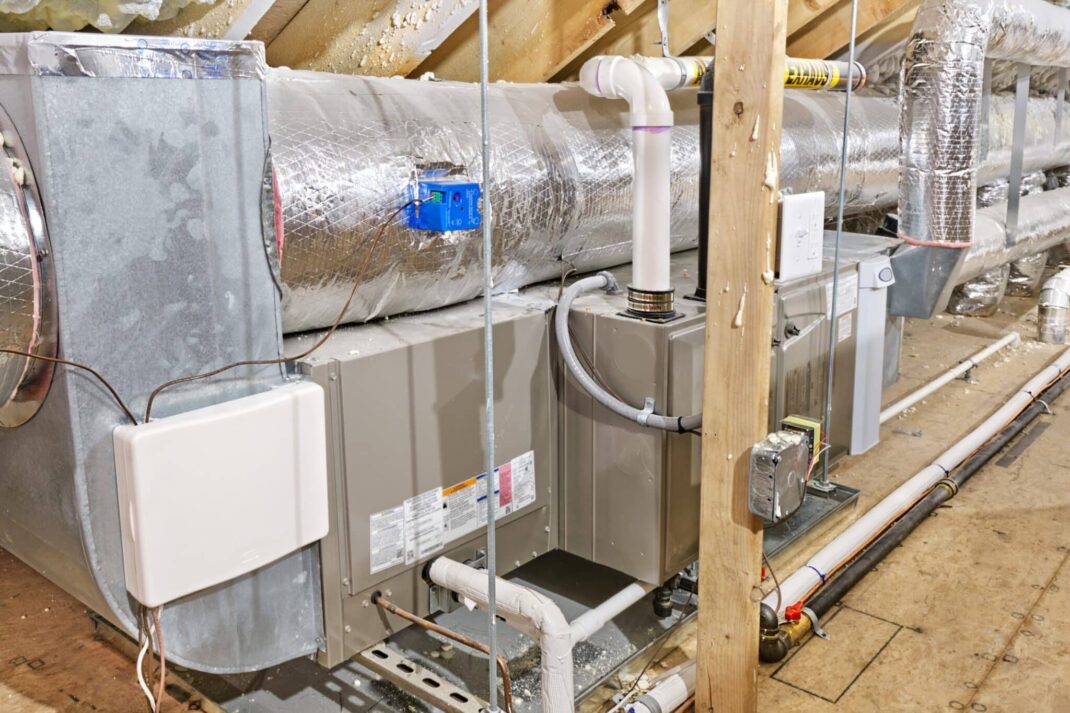
Staying cool during an Arizona summer requires more than a powerful air conditioner. It takes a full HVAC system working together to keep your home comfortable. One essential part of that system is often overlooked, air handlers. These hidden heroes play a major role in how efficiently your cooling system performs every day.
Air handlers help move cooled air through your home, making sure every room stays at a steady, comfortable temperature. They also clean the air, helping your family breathe easier. Without a reliable air handler, your system works harder, uses more energy, and costs you more money each month.
Efficiency matters, especially in cities like Lake Havasu and Parker, where the heat rises fast and stays strong. Understanding how air handlers work and keeping them in top shape can reduce your energy bills and increase your home’s comfort.
Knowing the function of air handlers leads to smarter HVAC decisions. With regular care, this part of your system improves airflow, controls humidity, and prevents unnecessary wear on your cooling equipment. Even small upgrades or maintenance tasks can deliver big benefits in both comfort and savings.
When temperatures soar, your comfort depends on more than cold air, it depends on how well your air handler does its job.
Understanding the Function of Air Handlers in HVAC Systems
Air handlers, integral to HVAC systems, manage air efficiently, ensuring a balanced indoor climate. Their primary function involves drawing in air, which then passes through filters, removing pollutants and allergens. This process significantly enhances indoor air quality, making environments healthier in Lake Havasu, AZ, and beyond. By maintaining clean airflow, these units contribute to a system’s overall performance and efficiency.
In addition to filtering, these units also regulate temperature. They work by adjusting the air’s temperature before it circulates through your home, ensuring comfort regardless of the season. This temperature control is particularly important in areas like Parker, AZ, where extreme temperatures can challenge the limits of HVAC systems. Efficient temperature regulation reduces the strain on other HVAC components, promoting longevity and consistent performance.
Moreover, air handlers play a crucial role in humidity control. By managing moisture levels in the air, they prevent the growth of mold and mildew, which can harm health and damage structures. This aspect is especially vital in regions with high humidity levels, where moisture control is as important as cooling or heating. Through this moisture regulation, air handlers help create a more comfortable and safer indoor environment.
Finally, the efficiency of air handlers directly impacts energy usage. By ensuring air moves smoothly and efficiently through the system, these components minimize energy waste. This efficient operation keeps HVAC systems running optimally, reducing unnecessary energy consumption. As a result, air handlers not only improve air quality and comfort but also support energy conservation efforts, making them key to the functionality and efficiency of HVAC systems.

The Impact of Air Handlers on Indoor Air Quality
Air handlers play a vital role in enhancing indoor air quality by continuously circulating clean, filtered air throughout residential and commercial spaces. They effectively capture dust, pollen, and other airborne particles, improving the health and comfort of occupants. This function is especially critical in Lake Havasu, AZ, where desert winds often introduce fine dust into homes. By filtering out contaminants, air handlers help create a healthier indoor environment and reduce common respiratory triggers.
These systems also support effective ventilation by bringing in fresh outdoor air and removing stale indoor air. This process is essential in tightly sealed buildings, such as those in Parker, AZ, where heat retention can trap indoor pollutants. By maintaining a steady exchange of air, they dilute and remove accumulated toxins and odors. The result is a consistently fresh and balanced indoor atmosphere.
Advanced designs allow these units to incorporate high-efficiency filters that trap even finer particles, including bacteria and airborne viruses. This capability is particularly beneficial for homes with children, elderly residents, or individuals with health conditions. It also provides a layer of defense in high-traffic public areas where air quality can impact well-being. With this added protection, air handlers extend their function beyond comfort into health safeguarding.
The benefits of optimal air quality management are far-reaching. Whether in Kingman, AZ, or other nearby communities, the presence of efficient air handlers directly influences the comfort, health, and productivity of indoor environments. By ensuring thorough filtration and effective air circulation, they stand as indispensable elements of any high-performing HVAC system.
Key Components of Air Handlers Explained
Air handlers are complex systems composed of key components that work together to drive HVAC efficiency and indoor comfort. At the core is the blower fan, responsible for moving air through ductwork and evenly distributing it throughout your home. This continuous circulation ensures rooms remain at a stable temperature, which is especially beneficial in Lake Havasu, AZ, where heat distribution can be a challenge. A high-quality blower not only improves comfort but also reduces energy strain across the entire system.
The filter is another essential element, capturing airborne pollutants like dust, pollen, and pet dander before they reach your living spaces. This function directly supports cleaner indoor air and a healthier environment. In Parker, AZ, where environmental pollutants are more prevalent, having a dependable filter in your air handler can significantly improve air quality. Replacing filters regularly ensures this component performs optimally and supports the system’s longevity.
Also crucial are the coils, which manage temperature by either heating or cooling the air passing through them. These components react to thermostat settings, conditioning the air to meet your comfort needs. The performance of these coils directly influences the HVAC system’s efficiency and energy consumption. Keeping them clean and functional is vital for maintaining consistent indoor temperatures and preventing performance loss.
The housing, often overlooked, plays a vital role in protecting internal components and reducing operational noise. A sturdy enclosure not only shields the unit from external debris but also contributes to quieter operation, an important feature for comfort. Altogether, each part of the air handler contributes to a seamless, energy-efficient, and dependable system that supports year-round indoor climate control.

How Air Handlers Contribute to HVAC Efficiency
Air handlers significantly boost the efficiency of HVAC systems by ensuring a seamless flow of air. Their ability to keep air moving efficiently means that HVAC systems don’t have to work as hard, leading to less wear and tear over time. In Lake Havasu, AZ, where the demand for cooling is high, this can make a substantial difference in system longevity. Properly functioning air handlers thus play a critical role in maintaining system efficiency and reliability.
One of the ways air handlers contribute to HVAC efficiency is through their impact on air quality. By circulating air through high-quality filters, they remove contaminants that can hinder the performance of the HVAC system. Cleaner air means that all parts of the system can operate more smoothly and efficiently. For residents in Parker, AZ, this not only translates to better air quality but also to a more efficient HVAC system overall.
Air handlers also help in evenly distributing air throughout a space, which is essential for maintaining consistent temperatures. This uniform distribution prevents the system from overworking to heat or cool certain areas, thereby conserving energy. The efficiency gained through this process ensures that homes in Kingman, AZ, enjoy a comfortable environment without putting unnecessary strain on their HVAC systems.
Lastly, the adaptability of these units to work with various components of an HVAC system further enhances their efficiency. Whether it’s integrating with advanced filtration systems or working alongside energy-efficient heating and cooling units, they ensure that the system’s performance is optimized. This adaptability not only improves efficiency but also makes them a key component in modern HVAC systems, catering to the needs of energy-conscious households.
Maintenance Tips for Optimizing Air Handler Performance
Keeping air handlers in peak condition starts with consistent, thorough cleaning. Over time, dust and debris naturally accumulate inside the unit, restricting airflow and diminishing efficiency. In Lake Havasu, AZ, where desert dust is a constant presence, routine cleaning helps prevent these particles from being recirculated indoors. A clean system not only boosts air quality but also keeps energy use in check.
One of the most effective maintenance steps is inspecting and replacing the filter on a regular basis. A dirty or clogged filter forces the system to overwork, consuming more energy while delivering less comfort. In Parker, AZ, where airborne allergens and pollutants are common, a fresh filter plays a critical role in maintaining clean indoor air. Swapping filters as needed is a small task with a big impact on overall performance.
The blower fan also deserves regular attention, as it’s essential for proper air circulation. If the fan isn’t functioning efficiently, airflow becomes uneven and the HVAC system must work harder to compensate. Catching wear or damage early through routine checks helps avoid costly repairs and keeps comfort levels stable. Ensuring the blower runs smoothly is key to preserving the effectiveness of your air handler.
Scheduling professional maintenance annually is one of the best investments you can make in your system’s longevity. Technicians can detect subtle issues that might go unnoticed during casual inspections, preventing breakdowns before they occur. Their expertise ensures all components of the air handler are calibrated and operating at maximum efficiency. With professional care, your system remains dependable, energy-efficient, and ready for the demands of every season.
Comparing Air Handlers with Other HVAC Components
When evaluating HVAC systems, air handlers consistently prove essential for delivering clean, well-circulated air throughout your home. Unlike compressors or condensers, which handle temperature transformation, air handlers focus on maintaining indoor air quality and ensuring consistent airflow. This capability is especially valuable in places like Lake Havasu, AZ, where dust and allergens often compromise indoor comfort. By managing airflow, they significantly boost the overall effectiveness of the entire HVAC system.
In Parker, AZ, the strengths of these components become even clearer when compared to thermostats or evaporator coils. While thermostats control temperature settings and coils manage heat exchange, these units ensure that conditioned air flows evenly through every space. Their operation complements these parts perfectly, creating a system that’s not just functional but genuinely optimized for comfort. It’s this seamless integration that makes them an indispensable part of a high-performance HVAC system.
Beyond airflow, these systems also support advanced filtration and humidity control, going far beyond the role of basic ductwork. They actively filter airborne particles and regulate moisture levels, making indoor environments healthier and more pleasant year-round. Especially in climates that fluctuate, this kind of reliability is hard to overstate.
Their adaptability further cements their importance. Whether integrated with smart thermostats or high-efficiency filters, these units elevate the performance of every other component they support. They’re not just parts of the system, they’re the reason the system runs at peak efficiency.
The Role of Air Handlers in Energy Consumption
Air handlers play a pivotal role in controlling energy consumption across HVAC systems. By circulating air efficiently, they prevent heating and cooling components from working harder than necessary. This function is especially critical in Lake Havasu, AZ, where high temperatures can lead to system overloads. By ensuring even airflow, air handlers reduce strain, ultimately lowering energy waste during extreme weather conditions.
Beyond temperature regulation, these units support energy savings by preserving air quality. They filter out dust, pollen, and other particles that could otherwise clog the system and hinder performance. In Parker, AZ, residents benefit from cleaner air and smoother airflow, which minimizes the energy needed to operate the system. As a result, improved air purity also translates to greater energy efficiency.
Modern design advancements also play a significant role in reducing energy use. Many air handlers feature variable speed motors, adjusting airflow to meet real-time demands. This technology avoids the constant, high-speed operation that consumes excess power, especially in climates with shifting temperatures. By responding dynamically, these systems cut down on unnecessary energy usage while still maintaining comfort.
Integration is another key to efficiency. When air handlers sync with thermostats and other HVAC elements, they create a finely tuned environment. This coordination eliminates guesswork and manual tweaking, streamlining both climate control and energy use. Through this synergy, they elevate both system performance and sustainability, proving their essential value in energy-conscious homes and offices.
Selecting the Right Air Handler for Your Home
When choosing the right air handler for your home, considering the size of your space is essential. A unit too small won’t efficiently circulate air, leading to uneven temperatures. Conversely, a large unit can cycle too quickly, not dehumidifying air properly. Finding a balance ensures your home in Lake Havasu, AZ, remains comfortable year-round.
Air handlers come with various features that can enhance your HVAC system’s efficiency. Selecting a model with a variable speed motor allows for better control of air flow and reduces energy consumption. This feature is particularly beneficial in Parker, AZ, where temperatures can vary greatly, requiring adaptable climate control solutions.
The compatibility of air handlers with your existing HVAC system is another critical factor. Ensure the unit you choose can integrate seamlessly, enhancing overall system performance. This consideration prevents potential issues and maximizes the efficiency of both heating and cooling operations, ensuring your home maintains optimal comfort levels.
Lastly, consider the air handler’s filtration capabilities. Models equipped with advanced filters can significantly improve indoor air quality by removing pollutants and allergens. This feature is crucial for maintaining a healthy living environment, especially in areas prone to dust and outdoor contaminants. Selecting the right air handler with these considerations in mind will contribute to a more efficient, comfortable, and healthy home.
Frequently Asked Questions
What is an air handler?
An air handler plays a crucial role in an HVAC system, ensuring efficient air circulation throughout your home. It works by moving air across the cooling or heating elements, then distributing it via ducts. This process helps maintain optimal indoor air quality and temperature control. By doing so, air handlers significantly contribute to the overall efficiency and effectiveness of your HVAC system.
How do air handlers improve HVAC efficiency?
Air handlers boost HVAC efficiency by optimizing airflow within the system. They ensure air moves smoothly over cooling and heating components, enhancing performance. This streamlined process reduces energy use, as the system doesn’t have to work as hard to maintain desired temperatures. Consequently, air handlers play a vital role in achieving energy-efficient, comfortable indoor environments.
Can HVAC systems work without air handlers?
HVAC systems rely heavily on air handlers to function efficiently. Without air handlers, these systems would struggle to circulate air properly throughout a space. This can lead to uneven temperatures and reduced comfort in homes. Therefore, while technically possible, an HVAC system’s effectiveness diminishes significantly without an air handler in place.
What maintenance do air handlers need?
Air handlers need regular maintenance to keep them running efficiently. This includes cleaning or replacing filters, inspecting coils and blower components, and ensuring there are no leaks in the ductwork. Technicians also check for proper airflow and adjust components as necessary. With these steps, air handlers can continue to improve HVAC efficiency and indoor air quality.
Are air handlers suitable for all buildings?
Air handlers are versatile and can enhance most buildings by improving air quality and system efficiency. However, their suitability depends on the specific HVAC needs and the building’s design. For large or complex structures, a customized solution might be necessary to ensure optimal performance. Overall, air handlers are a key component in maintaining comfortable and energy-efficient environments in a wide range of settings.







